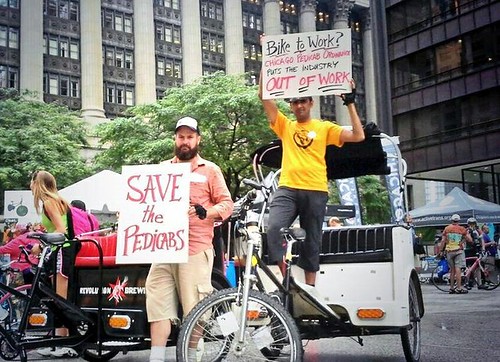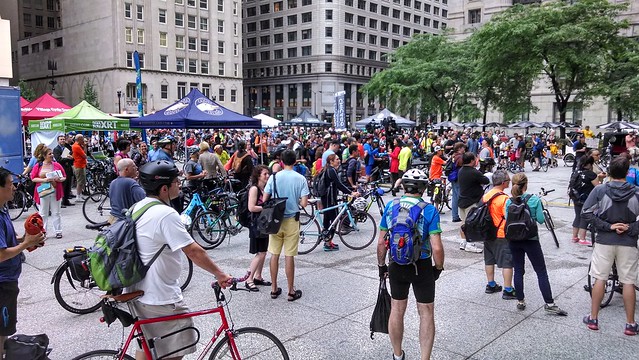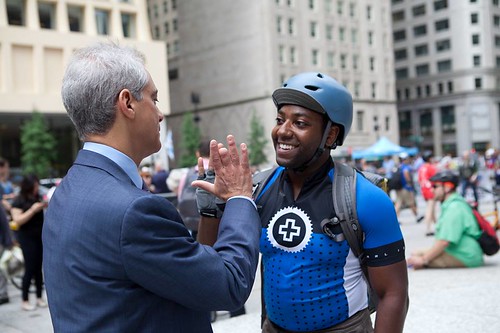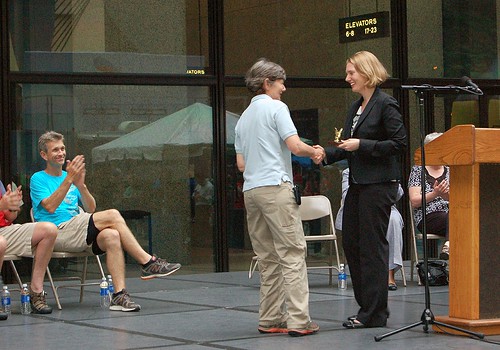Despite the gloomy weather this morning, hundreds of people pedaled to Daley Plaza for the annual Bike to Work Rally, where city officials provided an update on Chicago cycling initiatives. Among the cyclists were pedicabbers defying the city’s recently enacted ban on rush-hour pedicab use in the Loop to protest the ordinance but, happily, no $500 tickets were issued.
Unlike last year, Mayor Rahm Emanuel did not speak at the rally, but he did stop by for a few minutes near the end of the event to greet cyclists and take photos with them. Instead, Transportation Commissioner Rebekah Scheinfeld gave the traditional "state of the union" speech on local bike efforts.
Scheinfeld noted that before Emanuel took office in 2011, Chicago’s reputation as a great cycling city had declined. In 2001, Bicycling Magazine rated Chicago the best big U.S. city for biking, but by 2010, New York City had claimed that honor. She argued that Emanuel’s support for cycling has brought our city back to the forefront.
The commissioner noted that, under the current administration, the city has built roughly 40 miles of buffered bike lanes and 16.5 miles of protected lanes. The number of people riding bikes to work has tripled since 2000, and Chicago now has the second-highest total number of bike commuters of any American city, behind only NYC. She added that, on some Chicago streets, the number of bike trips is almost the same as car trips. For example, Milwaukee sometimes sees upwards of 7,000 bicycles a day.
The commissioner also touted the success of Divvy: in less than a year, the system has racked up 22,000 annual members, over 220,000 day pass sales, and 1.5 million rides, covering more than 3.3 million miles. She added that the recently announced $12.5 million Blue Cross Blue Shield of Illinois sponsorship of the system will help fund the expansion of bike-share into new neighborhoods, as well as bikeway maintenance and bike education programs.
However, Scheinfeld acknowledged that Chicago still has a long way to go before it is truly bike-friendly, noting that the city has seen two bike fatalities this year. The goal of the city’s “Zero in Ten” initiative, announced in 2012, is to eliminate all traffic fatalities. She argued that city efforts like innovative bikeways, safety education, and traffic cameras are helping to make this vision a reality.
The commissioner announced the recipients of this year’s Mayor’s Bike Advisory Council awards. In addition to Divvy and Blue Cross, she acknowledged Oscar Antonio Rivera Jr. for his work running the Albany Park education center Bikes N’ Roses, which has 30 youth apprentices. The city’s Greencorps Chicago bike and horticulture youth program was highlighted for providing paid work experience for 600 young people from low-income neighborhoods, some of whom have gone on to work for Divvy.
Scheinfeld also singled out 8th Ward Alderman Michelle Harris, who was initially skeptical of plans for a road diet, including buffered lanes, on South Chicago Drive. “Once she saw how bikeways could help calm traffic and make the street safer for people who walk, bike and drive, Alderman Harris became a leader in trying to change the perception and vision of what streets could look like in the South Shore area,” Scheinfeld said. Harris is now supporting new buffered lanes on Cottage Grove and Stony Island in her ward.
When Active Transportation Alliance director Ron Burke addressed the crowd, he lauded Divvy’s transformative effect on the cycling scene. He recalled seeing a middle-aged woman on a Divvy near his office, grinning ear-to-ear. She told him that it was the first time she’d ever tried urban cycling, and it was the most fun she’d had in years, then high-fived him.
While rally attendees enjoyed a free breakfast and browsed booths promoting Divvy, Active Trans, and other cycling advocacy organizations like West Town Bikes and the Chainlink, members of the nonprofit Chicago Pedicab Association held their low-key protest. They were there to highlight the irony that, due to a new ordinance’s ban on operating pedicabs in the Loop during rush hours, it was illegal for them to attend the Bike to Work Rally with the bikes they work on.
CPA board member T.C. O’Rourke (a friend and former coworker of mine) said that the police didn’t confront the pedicabbers at the event, but they did receive an “overwhelming” amount of support for their cause from attendees. Emanuel even dropped by and posed for a photo with O’Rourke, although he declined to sit in his cab.







